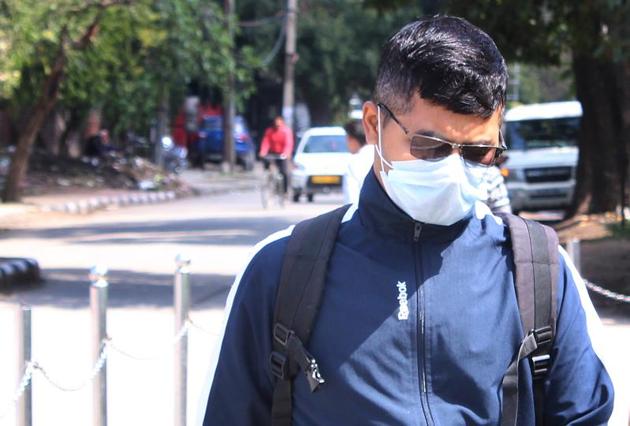Chandigarh move to make masks a must in public not in tune with WHO, Union ministry guidelines
WHO says it may lead to neglect of other essential measures, such as hand hygiene practices and physical distancing; health ministry advises masks be worn only if one is ill with Covid-19 symptoms, especially coughing, or looking after someone who may have symptoms.
The Chandigarh administration’s recent decision to make the wearing of masks mandatory in public places is not in tune with the guidelines of World Health Organisation (WHO) and Union ministry of health and family welfare.

The administration, in its media release on Wednesday, cited Maharashtra’s example – where confirmed COVID 19 cases are exponentially higher than Chandigarh – to make wearing a mask mandatory in public places to tackle coronavirus crisis. The UT police have also been asked to warn people to wear the masks in public places. Chandigarh has seen 18 coronavirus cases so far but no one has tested positive since Monday, whereas in Maharashtra, the positive cases have crossed 1,100.
The Punjab government has also made wearing masks a must in public spaces as a preventive measure.
‘CREATES FALSE SENSE OF SECURITY’
In its updated guidelines on April 6, the WHO said: There is limited evidence that wearing a medical mask may be beneficial as a preventive measure. Moreover, it may create a false sense of security, with neglect of other essential measures, such as hand hygiene practices and physical distancing.
Also, Union Ministry of Health in its advice on masks too said that the masks should only be worn if one is ill with COVID-19 symptoms (especially coughing) or looking after someone who may have symptoms.
The most effective ways to protect yourself and others against Covid-19 are to frequently clean your hands, cover your cough with the bend of elbow or tissue and maintain a distance of at least 1 meter.
PREVENTIVE MEASURE
Dr JS Thakur, a professor at the department of community medicine in PGIMER, agreed that except patient, hospital staff and attendants, not everyone is required to wear mask. There is already shortfall of masks in hospitals, recommending it to the general public will create further shortfall, he said.
The president of the Chandigarh chapter of Indian Medical Association, Dr Rajesh Dhir, however, said that WHO’s recommendations are just advisories. “Wearing a mask is definitely an additional protection from the virus. But one must understand it is not dilution of other prevention measures. Secondly, people must know how to use and dispose it of,” he said.
When contacted, Dr G Dewan, the director of health services, UT, said that the move will help in stopping community transmission. Neighbouring states have also followed it.
LACK OF AWARENESS
On the ground, the UT lacks an awareness drive despite pressing for the use of masks in public spaces.
Local resident welfare association president Hitesh Puri said that people are using the same mask multiple times, while the medical superintendent at the government hospital in Sector 16, Dr VK Nagpal, clarified that the maximum life of a surgical mask, normally available in chemist shops, is not than eight hours or even less if it gets dirty.
UT adviser Manoj Parida’s tweet on Wednesday suggesting that homemade masks are less effective in dealing with the virus has also added to confusion at a time when the Centre is advocating home-made masks, which according to experts, can be reused after washing.
TIPS TO GET IT RIGHT
Place the mask over the nose, mouth and chin and ensure there is no gap.
Avoid touching the mask while in use.
Don’t leave the mask hanging from the neck.
Don’t touch potentially contaminated outer surface while removing it.
Change the mask after six hours.
Never reuse disposable masks.
Dispose the used masks in a closed bin after disinfecting them.
Source: Ministry of health and family welfare






